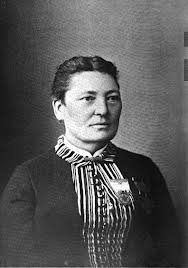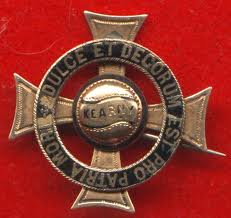 Michigan’s Regimental Angel, Anna Etheridge, was not only a Union Vivandière Hero, but a fearless battlefield inspiration and nurse to hundreds of her Michigan comrades during the Civil War. Placed in circumstances of peculiar moral peril, her goodness and purity of character were so strongly marked that she was respected and beloved not only by all her own Michigan regiment, but by the brigade division and corps to which that regiment belonged, and so fully convinced were the officers from the corps commander down, of her usefulness and faithfulness in the care of the wounded, that at a time when a peremptory order was issued from the headquarters of the army that all women, whatever their position or services should leave the camp, all the principal field officers of the corps to which her regiment was attached united in a petition to the general-in-chief, that an exception might be made in her favor.
Michigan’s Regimental Angel, Anna Etheridge, was not only a Union Vivandière Hero, but a fearless battlefield inspiration and nurse to hundreds of her Michigan comrades during the Civil War. Placed in circumstances of peculiar moral peril, her goodness and purity of character were so strongly marked that she was respected and beloved not only by all her own Michigan regiment, but by the brigade division and corps to which that regiment belonged, and so fully convinced were the officers from the corps commander down, of her usefulness and faithfulness in the care of the wounded, that at a time when a peremptory order was issued from the headquarters of the army that all women, whatever their position or services should leave the camp, all the principal field officers of the corps to which her regiment was attached united in a petition to the general-in-chief, that an exception might be made in her favor.
Lorinda Anna Blair was born May 3, 1839, in Wayne County, Michigan. Her parents, Cynthia and John, had two other children, Maria and John, 6 and 4 years of age. Anna’s father was a blacksmith; he died when she was very young and the family moved to Wisconsin. Anna returned to Michigan and by 1861 she had been married twice. Very little is known of either husband, her first husband, a David Kellog, is a complete mystery and of the second, James Etheridge, Anna kept only the name.
When the Civil War broke out, Etheridge enlisted as a Daughter of the Regiment, in the Second Michigan Infantry, in Detroit, but soon transferred her allegiance to the Third Michigan, and lived in the field with it. Anna was described as of Dutch descent, about five feet three inches tall, with a fair complexion, brown hair and a “vigorous constitution, and decidedly good-looking.” She never carried a musket, though she had a pair of pistols in her holsters, but seldom or never used them. Etheridge was for a time during the winter, engaged in hospital service, and when the Army of the Potomac went to the Peninsula, during the Chickahominy campaign she was on a hospital transport with Miss Amy M. Bradley and rendered excellent service there. Etheridge was a very tender and careful nurse, and seemed to know instinctively what to do for the sick and wounded.
Anna returned to Alexandria with her Michigan regiment and was with them at the second battle of Bull Run, on August 29, 1862. Early in this battle she was on a portion of the battle-field which had been warmly contested, where there was a rocky ledge, under shelter of which, some of the wounded had crawled. Anna lingered behind the troops, as they changed position, assisted several poor helpless fellows to this cover and dressed their wounds. On another portion of that bloody field, Anna was kneeling by the side of a soldier binding up his wounds, when hearing a gruff voice above her, she looked up and to her astonishment saw General Kearny checking his horse beside her. He said, “That is right; I am glad to see you here helping these poor fellows, and when this is over, I will have you made a regimental sergeant;” meaning of course that she should receive a sergeant’s pay and rations. But two days later the General Kearny was killed at Chantilly.
 Etheridge was present at the battles of Fredericksburg and Chancellorsville. It was at Chancellorsville where she won most of her fame and was awarded the Kearny Cross for her bravery under fire. It was in this battle that she was wounded in the hand when an officer attempted to hide behind her. He was killed, Anna’s horse was hit and dashed through the woods in fear and panic. They emerged in a clearing, plunging into the midst of the Eleventh Corps, where several soldiers caught and halted the frightened animal.
Etheridge was present at the battles of Fredericksburg and Chancellorsville. It was at Chancellorsville where she won most of her fame and was awarded the Kearny Cross for her bravery under fire. It was in this battle that she was wounded in the hand when an officer attempted to hide behind her. He was killed, Anna’s horse was hit and dashed through the woods in fear and panic. They emerged in a clearing, plunging into the midst of the Eleventh Corps, where several soldiers caught and halted the frightened animal.
Detroit, Michigan newspapers of the era, the Advertiser and Tribune reported in early 1863 that Anna “has for her use a horse, furnished with side-saddle and saddle-bags. At the commencement of a battle, she fills her saddle bags with lint and bandages, mounts her horse, and gallops to the front, passes under fire, and, regardless of shot and shell, engages in the work of stanching and binding up the wounds of our soldiers and when not actively engaged on the battlefield or in the hospital, she superintends the cooking at the headquarters of the brigade. When the brigade moves, she mounts her horse and marches with the ambulances and surgeons, administering to the wants of the sick and wounded, and at the bivouac she wraps herself in her blanket, and sleeps upon the ground with all the hardihood of a true soldier.”
At the Battle of Gettysburg, Etheridge had marched there with her regiment, riding her horse at the rear of the soldiers. At Trostle Farm, on July 2, 1863, Anna was seen walking among falling shells, retreating from the Peach Orchard with her regiment, and riding her horse back amid falling shrapnel. From time to time, she would dismount to tend wounded or help a limping soldier back to the rear. On the third day of the battle Anna had retired from the front and was seen tending wounded of her regiment at the Third Corps Hospital behind the Round Tops.
When the Third Michigan was mustered out of service on June 10, 1864, those men of the Third who had reenlisted were consolidated into the Fifth Michigan and Anna moved right along with them. Daniel G. Crotty, an Irish Immigrant, of the Third Michigan wrote in his memoirs, during the campaign in Virginia in 1864, that Anna “has remained with the colors, but this time we are up too close to the front line, and unless we get back we may be captured. So we have to do some tall walking to get out of the swamp we have got into. Anna falls back with us in good order, but her dress is a little torn by the brush. One of our boys is borne back wounded, our heroine dresses up his wound. The balls fall thick and fast around her, but she fears them not, and performs her task as coolly as if she was in camp and out of danger. I need not mention this one instance, hundreds of the same kind could be related to her. She is still with us through thick and thin for the last three years.”
In the summer of 1864, General Ulysses S. Grant ordered all women to leave the Union camps. Anna was forced to leave her regiment, but she did not go home. Etheridge joined the hospital service at City Point, Virginia.
After the war ended, Anna Etheridge returned to Detroit, Michigan with her regiment and remained with them until they were mustered out in July 1865. Though her health had been somewhat compromised by her traumatic experiences, she took a job at the Treasury Department and worked 12 hours a day. In 1870, she married a war veteran named Charles Hook. Anna had received no pay for her four years of service in the Union Army during the Civil War. In 1886 she requested a pension of $50 a month. In 1887 Congress approved a pension of $25 a month. Anna Blair Etheridge died on January 23, 1913 and received a veteran’s burial at Arlington National Cemetery.
A letter from a dying comrade is a poignant tribute to Michigan’s Regimental Angel,
“Annie—Dearest Friend: I am not long for this world, and I wish to thank you for your kindness ere I go.
You were the only one who was ever kind to me, since I entered the Army. At Chancellorsville, I was shot through the body, the ball entering my side, and coming out through the shoulder. I was also hit in the arm, and was carried to the hospital in the woods, where I lay for hours, and not a surgeon would touch me; when you came along and gave me water, and bound up my wounds. I do not know what regiment you belong to, and I don’t know if this will ever reach you. There is only one man in your division that I know. I will try and send this to him; his name is Strachan, orderly sergeant in Sixty-third Pennsylvania volunteers.
But should you get this, please accept my heartfelt gratitude; and may God bless you, and protect you from all dangers; may you be eminently successful in your present pursuit. I enclose a flower, a present from a sainted mother; it is the only gift I have to send you. Had I a picture, I would send you one; but I never had but two, one my sister has; the other, the sergeant I told you of; he would give it you, if you should tell him it is my desire. I know nothing of your history, but I hope you always have, and always may be happy; and, since I will be unable to see you in this world, I hope I may meet you in that better world, where there is no war. May God bless you, both now and forever, is the wish of your grateful friend,
George H. Hill, Cleveland, Ohio.”
Bummer


I’m enjoying these recent posts about women in the Civil War. Except for isolated stories (the only civilian killed at Gettysburg was a woman) it’s too easy to think of the war as involving men only.
Louis,
The women of the Civil War are fantastic characters, most have so thin a history, hard to tell the truth from the myth. Will follow up with more Civil War Heroines. Thanks for following.
Bummer